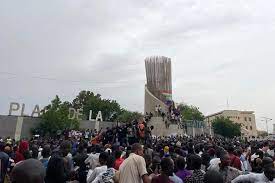Baria Alamuddin
Hardly a single state across Africa’s vast Sahel region has escaped the curse of coups in recent years. With Niger the latest victim of this pandemic of military mutinies, destabilization of this obscure state will have profound consequences for Africa and global security. Just a few weeks ago, an African security analyst contextualized Niger to me as a “precarious success story.”
In neighboring Mali, Burkina Faso and northeastern Nigeria, extremist groups have been expanding across vast swaths of territory – yet Niger, meanwhile, witnessed a marked decline in significant terrorist activity. President Mohammed Bazoum was voted into office just two years ago in Niger’s widely celebrated first peaceful, democratic transfer of power since independence in 1960.
Next door in Mali, two coups in quick succession around 2021 fundamentally destabilized the country, bringing forth a pro-Russia regime that demanded the withdrawal of all Western counterterrorism forces. This was, predictably, a disaster, as Daesh and Al-Qaeda flooded into the gigantic vacuum created by the departure of the foreign troops. Civilian and military deaths have soared, amid hundreds of reported security incidents every month. In the aftermath of Mali’s coups, Russia’s Wagner Group mercenaries made matters 100 times worse by perpetrating horrific massacres, which drove communities into the terrorists’ open arms. A further 2022 coup in Burkina Faso enabled extremists to take de facto control of about 40 percent of the country. As recently as 2021, Daesh’s Sahel branch was ramping up its activity in Niger, building up a substantial presence among tribes within the country’s western Tillaberi region, a stone’s throw from the capital, Niamey. The plurality of extremist groups – including Boko Haram and Daesh – to the eastern Lake Chad region threatened to entrap the country from both sides within a terrorist pincer grip.
Yet, with major security gains throughout 2022, Niger increasingly resembled a regional oasis of stability, particularly as Western forces relocated there from Mali. Over a thousand US troops have been stationed in Niger, alongside 1,500 French soldiers, with major American drone bases in Niamey and Agadez. The EU has allocated €500 million ($550 million) in aid since 2021. Niger constituted the cornerstone of the West’s Sahel strategy; not just due to counterterrorism, but also as a vital node for restricting northward flows of migrants. The West is now threatening to fully freeze aid and cooperation if Bazoum and democracy are not restored. But coup leader Gen. Abdourahmane Tiani – having declared himself president – does not look to be going anywhere. “Our economic and security partnership with Niger – which is significant, hundreds of millions of dollars – depends on the continuation of the democratic governance and constitutional order that has been disrupted by the actions in the last few days,” US Secretary of State Antony Blinken declared.
Meanwhile, the vultures are circling over Niger, with its rich uranium reserves. Western pressure could simply drive the new regime into Moscow’s welcoming embrace. Senior Russian figures praised the coup and coup supporters jubilantly waved Russian flags in the streets of Niamey. Wagner leader Yevgeny Prigozhin – who has recent personal expertise in staging coups – eulogized that “what happened in Niger represents the struggle of Niger’s people against colonizers, who tried to impose their own rules.” Prigozhin’s online trolls have long been pumping out polarizing anti-Western social media propaganda throughout the Sahel. Sudan, meanwhile, was plunged into catastrophic bloodshed after the paramilitary Rapid Support Forces in April staged its own attempted power grab, purging the regular military from most of Khartoum. The RSF concurrently embarked on a genocidal campaign against rival Darfur tribes, giving rise to levels of death and destruction comparable to the horrific zenith of the post-2003 Darfur conflict.
Despite the mediation efforts of Saudi Arabia and others, the two Sudanese sides appear hell-bent on continuing to fight each other, with Wagner and other parties reputedly adding fuel to the fire by funneling arms to the RSF. The vast influx of refugees into fragile neighboring Chad poses a further threat to regional stability. As The New York Times noted, the Niger coup “toppled the final domino in a band across the girth of Africa, from Guinea in the west to Sudan in the east, now controlled by juntas that came to power in a coup – all but one in the past two years.” These represent profound setbacks for regionwide governance and security. Africa has witnessed 98 successful coups since 1952.
Even in states where semi-legitimate governing powers are present in national capitals, the Sahara-straddling Sahel region hosts unimaginably large ungoverned spaces; offering optimum conditions for terrorist and anti-state forces to establish themselves. The only factor preventing the likes of Daesh, Boko Haram or Al-Qaeda seizing these immense regions is the fact that these rival extremists are usually too busy fighting each other. The worst thing the world could do now is throw up its hands and decide that the Sahel coup belt’s plenitude of crises is too vast to address. Just as Osama bin Laden established training camps for plotting attacks against the West in remote Afghanistan and Abu Bakr Al-Baghdadi centered his caliphate on the twin capitals of Raqqa and Mosul, the consolidation of a Sahel-wide extremist superstate is possibly only a matter of time. Opening the region’s floodgates for mass migration would have similarly immense global ramifications. Brutal cuts to Western aid for the world’s poorest states and Russia’s on-off blockade of Ukrainian grain have further worsened this region’s plight. As China’s population falls and India’s birth rate decelerates, Nigeria, Ethiopia and the Congo will become the demographic behemoths of the 21st century. The young people from these regions will become a significant portion of the global workforce, as the continent’s population nearly doubles to about 2.5 billion by 2050, at which point more than half of Africa’s citizens will be under 25 years old.
If these young people are to be an asset rather than a burden, these rapidly growing countries will need assistance in sustainably expanding their economies and providing world-class education. Continent-wide economic growth, at around 3 percent, remains way too sluggish to even begin lifting these nations out of poverty – despite Africa’s immense mineral and agricultural resources. For Sahel states, the distances are too impossibly vast and the resources too thinly spread for much of this strategically crucial yet desperately impoverished region to ever enjoy stability without copious and sustained international support, cultivating effective governance, facilitating long-term stability and conferring modern amenities upon far-flung, long-forgotten communities so that they do not seek succor from bloodthirsty terrorists. Meanwhile, climate change and over-farming cause millions of hectares of Sahel territories to be progressively lost to inexorable desertification. Demographics dictate that this is to be an Africa-led 21st century. Yet it is up to the international community whether fragile Sahel states will constitute a bountiful breadbasket for exporting resources or a broken basket case for exporting terrorism and instability.
Arab News







